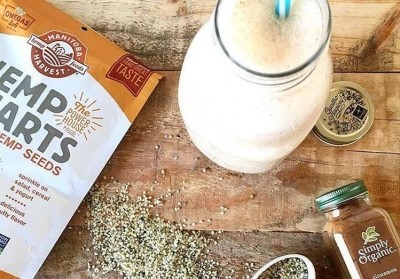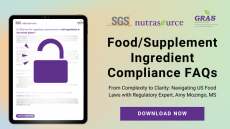RE Botanicals founder talks hemp-derived CBD: ‘I’ve never seen a product that has this much grass roots momentum’

“As a 20-year veteran of the natural and organic foods industry I’ve never seen a product or category that has this much grass roots momentum,” said John Roulac, a pioneer in the hemp foods industry who founded natural foods brand Nutiva in 1999, stepped down as CEO in 2017 and went on to found Boulder, CO-based RE Botanicals, which sells organic full spectrum ‘whole plant-based’ hemp extracts.
“Growth in hemp foods (seeds, oils etc) has slowed, although there is still a lot of interest, and you still can’t find a more nutritious food than hemp hearts," said Roulac.
“But hemp CBD is the new shiny penny, where the excitement is for shoppers. The hemp CBD landscape is a bit like the Wild West right now… it’s buyer beware, but there will be a shift. What I come back to is the fact that people are buying these products again and again because they are getting a benefit.”
He added: “I’ve seen market predictions of $1.9bn in US retail sales of CBD in 2022, but I’m predicting that it will be $4-5bn by 2022.
“The passage of the 2018 Farm Bill takes hemp out of schedule 1 [of the Controlled Substance Act], and that’s a big change [the DEA can’t come knocking on your door for selling hemp extracts]. There have been issues to iron out over things like which parts of the plant to sample for THC testing [the bill de-schedules hemp with a THC concentration of <0.3%] but I think 2019 is going to be the year of hemp.
“It’s just going to make hemp more acceptable, whether it’s hemp foods or hemp CBD extracts.”

'The FDA has completely ignored the historical use of hemp extracts'
But what about the legal confusion surrounding hemp derivative CBD [cannabidiol] – which the FDA has repeatedly said is not permitted in foods, beverages or supplements regardless of the passage of the Farm Bill, because it was first investigated as a drug?
To that, Roulac says hemp extracts and the isolated CBD used in approved epilepsy drug Epidiolex are two different things: “If you look at the FDA’s latest statement, they don’t mention hemp extracts, they refer only to CBD as an active ingredient in FDA-approved drugs.
“But what most people in foods and supplements are selling is not the isolated CBD that’s in Epidiolex, they’re selling full spectrum hemp extracts [which contain CBD]. They are not drugs, they are supplements.
“The FDA also says no one was selling CBD before it was investigated as a new drug, but people have been selling hemp extracts since the 1850s under the term ‘cannabis sativa extracts.’ They were widely in commerce, so in my view there is no legal basis to say that hemp extracts cannot be sold as a supplement. The FDA has completely ignored the historical use of hemp extracts.”
‘Whole Foods has made a decision not to sell hemp extracts until there is more clarity from the FDA’
That said, many retailers – who are wrestling with state and federal laws in this space – are still wary of getting involved, although this is changing, said Roulac.
“There’s confusion out there and larger retailers don’t want to sell anything that says CBD on the label. We use the term hemp extracts on our products, but Whole Foods has made a decision not to sell hemp extracts until there is more clarity from the FDA, and others are sitting on the fence. But I think you’ll see some major retailers that you wouldn’t expect selling them in February and things could change a lot once we get to Expo West [in March].”
Deals with conventional supermarkets in the pipeline
While it can be difficult for consumers to compare CBD brands, Roulac says RE Botanicals is building a platform around certified organic hemp extracts sourced from hemp grown by American farmers, and full transparency around the processing, in order to create a brand shoppers can trust.
“Many players from the cannabis industry have moved into hemp. They are contracting for hemp grown with synthetic fertilizers,” claimed Roulac, “so I said how about we build a world class team of organic and natural foods CPG execs and come together and build an ethical organic apothecary brand?
“We’ve partnered with Presence Marketing, which represents the biggest natural and organic brands in the country, to represent us to conventional as well as natural food stores - they are also an investor in the company - and in a couple of weeks we’ll be ready to announce that we will be rolling out in conventional supermarkets.”
We're just scratching the surface
But what does he say to those who wonder if the emperor has no clothes? What clinical evidence* is there that small doses of hemp extracts - which are all different – confer health benefits, from reducing anxiety to managing joint pain or exercise induced inflammation (some of the many claims made by supplement makers)?
Much of the evidence is anecdotal, concedes Roulac, but consumers don’t usually keep coming back for more of a product that doesn’t deliver any discernible benefits, he insisted.
“We’re just scratching the surface when it comes to our understanding of what CBD can do.”
*National Academies of Sciences, Engineering, and Medicine: The health effects of cannabis and cannabinoids: the current state of evidence and recommendations for research. Washington, National Academies Press, 2017, DOI: 10.17226/24625.





















